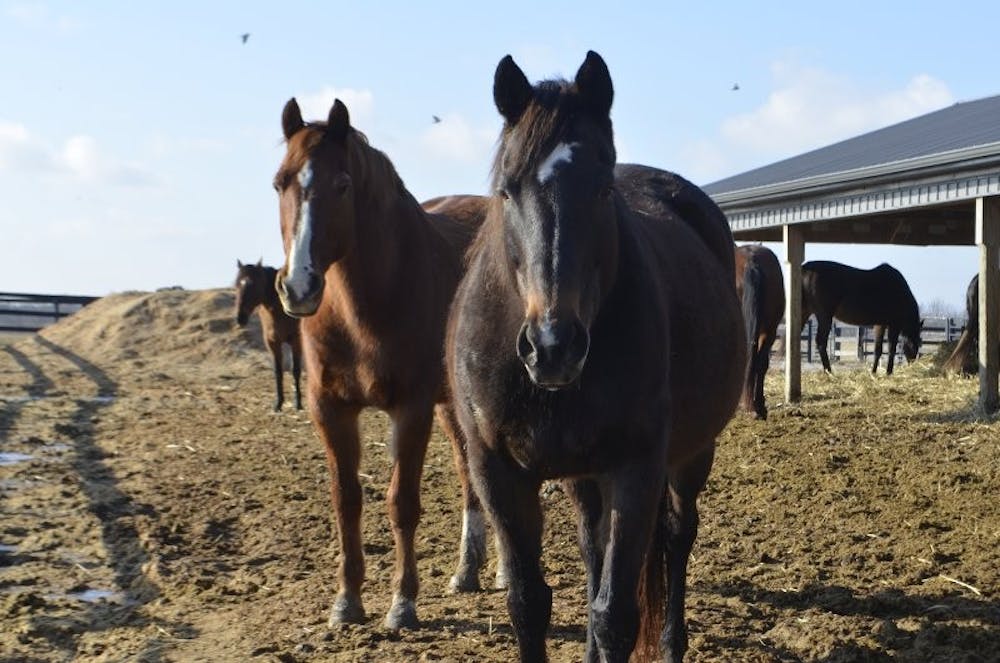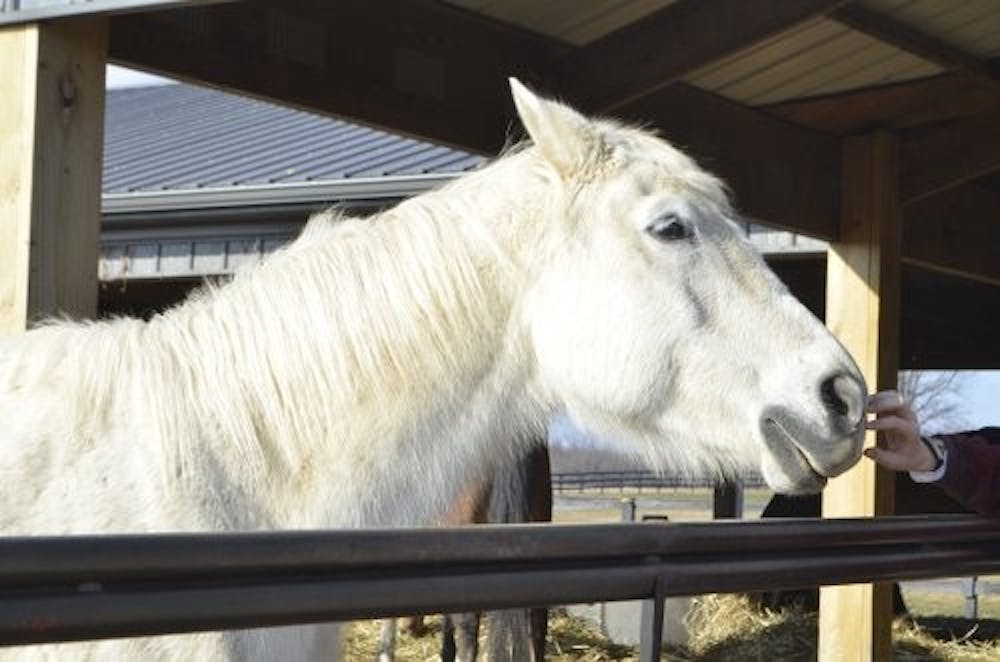By Lindsay Robinson | Echo

Off an unassuming country road in Marion, Ind., sits Black Dog Farms, home to Taylor's Equestrian team. While the word Equestrian may conjure up images of fancy ribbons, a dirt track, white picket fence and stately riders, there is something behind the glitz and glamour of horse-riding that can be just, if not more, beautiful and extraordinary.
Equine Assisted Psychotherapy (EAP) is a therapy technique that heals patients in need of psychological attention through the presence and interaction with horses. Maggie Boyle, owner of Black Dog Farms, works in conjunction with Paddock View Residential Center in Marion to offer EAP to its residents.
Paddock View is a transition home for children and teenagers who are either facing time in jail or have gone through the system and have been sent there by the courts. While at Paddock View, residents attend school and participate in therapy programs such as the one that Black Dog Farms provides.
"This is a less restricted environment," Boyle explained. "The work is all on the ground and it involves problem solving, anger management and nonverbal communication. They do group work with their horses so there is frustration involved, communication with their peers and problem solving."
These children, usually between the ages of 10 and 17, come from very difficult situations. It is the dynamic interaction that transpires between the horse and the child that allows for understanding and healing.
"The adults around them (the children) have all decided what is wrong with them but nobody really asked them. The horses ask them, they tell them, they help work that out for them," Boyle said.
A lot of time and work is needed by both participants in the relationship. The program aims to provide a framework on which trust, communication and life skills can be fostered.
"A lot of them are sure that horses have nothing to do with the world. They can't image what horses would have to do with making decisions…and they get through the program and they go 'Man, I really learned a lot. I didn't want to but I really learned a lot,'" Boyle said.
Boyle tells the story of a young man who after leaving Paddock View found himself in trouble again and returned to the home, re-entering the EAP program. When the time came for his case to be re-evaluated, the judge asked him what he learned during his second time participating in the EAP program. The young man told the judge, "I learned that when I work with my horse, I've got to pay attention to what I'm doing because there's piles of poop everywhere. Judge, I've learned there's a lot of piles of poop in my life and I've got to learn to navigate it without stepping in them."
Boyle describes EAP as a learning process, both for the child and the horse. She explains that the process is made easier by the horses' ability to read a person's non-verbal cues and respond to those cues in a way that speaks volumes.
"A lot of these kids are trying to figure out how to be smarter about the choices they make in their life and they've learned the right words to say, but the horses can really tell if they believe you," Boyle explained. "They pretty much know what's happening, they read your non-verbal communication, your body language really well and tell what you're really thinking as opposed to what you are saying."
The horses at Black Dog Farms come from backgrounds where they are used to interacting with people. Some are show horses and others have been used as lesson horses. To match each child up with the horse that will speak best to the child's specific needs, Boyle uses the input of the professionals at Paddock View and childrens' case managers.
"My job as the horse professional is to really know the horses very well and pick the appropriate horses along with the mental help professional that fit the kid and the exercise and fit whatever skill we are working on so to speak," Boyle explained.
Boyle has worked with horses her whole life and enjoys seeing the potential that the horses and the people who work with them can reach by interacting with each other. For Boyle, finding true potential is about finding the right niche; whether it is horses that need that extra attention or humans that need a different therapeutic approach to find healing.
"Often they help the kids to open up because the horses listen and they respond to what they're hearing. Usually it's the non-verbal part they are responding to. They think it is pretty cool that they can tell their life story to the horse and it may have been a story they haven't told anyone but they told somebody so maybe now they can go out into the world with it," Boyle said. "The horses are very non-judgmental, they really take whatever attitude you approach them with and work with you from there."
No more than ten years ago, Black Dog Farms was a cornfield. But thanks to Maggie Boyle's persistence and dedication, it is now a home for the animals that live there and the people that find peace alongside their four legged companions.




